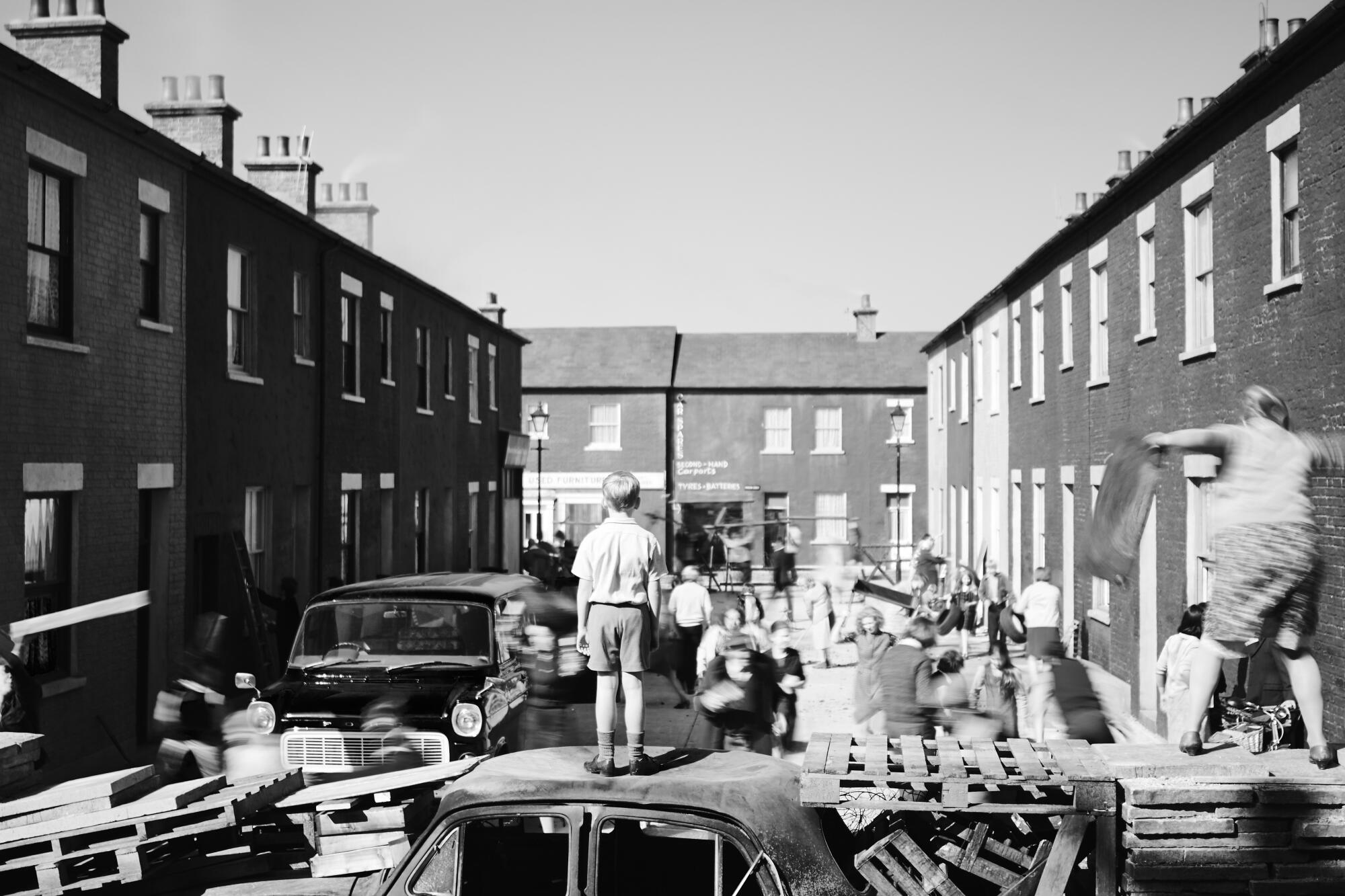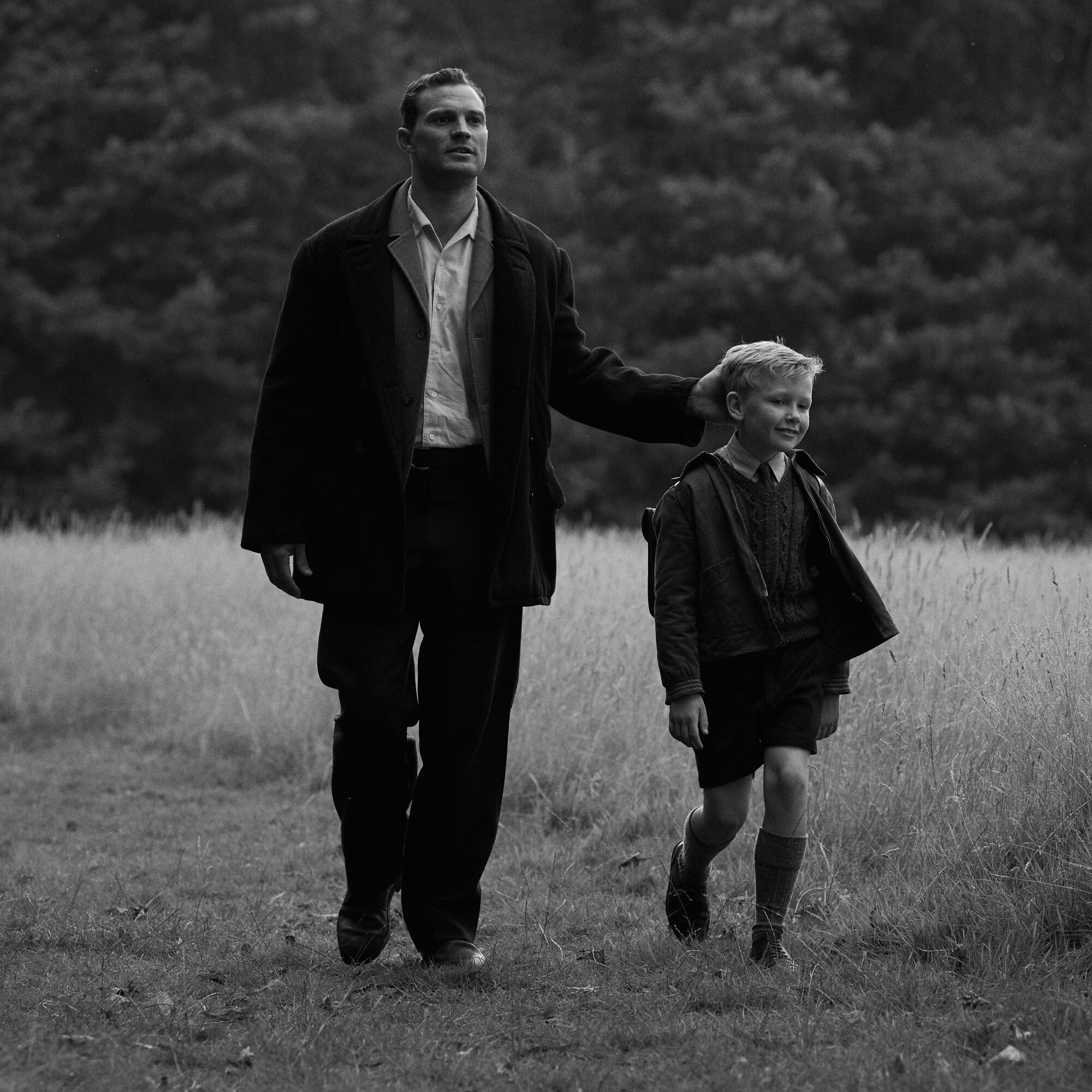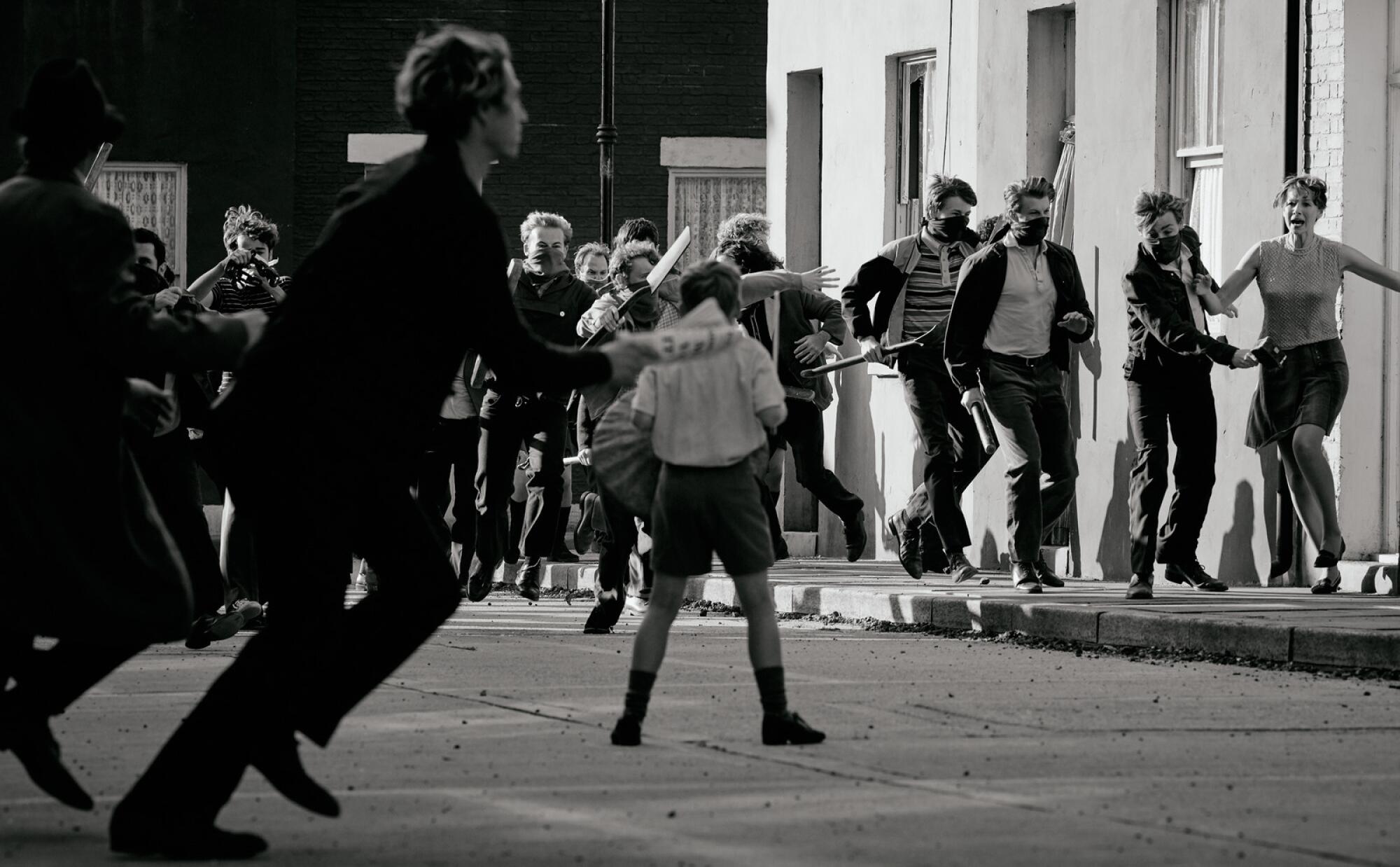
- Share via
“Belfast” was not my favorite movie of 2021 (not that anyone was asking) but it is the film that gave me the most hope, and at a time when hope is worth more than rubies, or even an Oscar campaign.
Told from a child’s point of view, “Belfast” is a deceptively small and simple movie that manages to do something extraordinary: examine the trauma that ethnic and sectarian violence inflicts not only on the group being targeted but on those members of the “privileged” majority who want no part in it.
It’s a long way from 1993’s “In the Name of the Father,” the last Troubles-related film to get a slew of Oscar nominations.
Or maybe not.
Based on the wrongful imprisonment of the Guildford Four, “In the Name of the Father” follows British authorities’ torture and imprisonment of Gerry Conlon, a Belfast man mistakenly accused, and convicted, of an IRA bombing. The film was so rigorous in its depiction of the anti-Irish attitude that led to Conlon’s treatment that, after a special screening for British lawmakers, a few members of Parliament voiced outrage.
Based on writer-director Kenneth Branagh’s own life, “Belfast” is the story of a Protestant family driven out of Northern Ireland by the same Protestant Loyalist forces that were attempting to purge certain neighborhoods of Catholics in what became known as the Troubles. (Honestly, you can’t beat the Irish for deadpan understatement.)
The film begins with 9-year-old Buddy (Jude Hill) shocked and frightened as a mob attacks Catholic businesses and homes, destroying the peace of his neighborhood and the idyll of his childhood, and follows his family as they come to grips with life in what is essentially a war zone.
As many critics have pointed out, Branagh’s decision to tell the story as memoir, with a child’s-eye view, precludes anything but the most basic understanding of Ireland’s centuries-old conflict. Buddy’s conversations with his mother (Caitríona Balfe), Gran (Judi Dench) and cousin Moira (Lara McDonnell) define the tension strictly along religious lines; Buddy’s family agrees that Catholics are a bit weird, with their habit of confession and no-meat Fridays, but there’s no harm in them.
The nationalist division between Irish Republicans, most of them Catholic, who wanted to end British rule entirely and bring Northern Ireland into the Republic, and Unionists, who remained loyal to Great Britain, is not examined in any way because, well, Buddy is 9 and his family is not at all political. They’re more worried about paying the bills than what a united Ireland might mean to them.

When Buddy’s Pa (Jamie Dornan) is given an ultimatum by Unionist thugs — join us or suffer the same fate as the Catholics — he realizes he has to get his family out of Belfast.
The Troubles, which began in 1969, the year in which “Belfast” is set, dominated the news cycle for nearly 30 years, including most of my childhood and much of my young adulthood. I am 100% Irish American so it was not just the news cycle that the Troubles dominated. As Patrick Radden Keefe points out in his book “Say Nothing: A True Story of Murder and Memory in Northern Ireland,” Irish Americans were, at least verbally, often more passionate about the fight for a united Ireland than most Irish; I still remember jars sitting discreetly on many Irish American pubs’ bars to receive donations for the IRA.
All of my ancestors emigrated during the Famine and the years following, and none, as far as I know, came from any of the six counties that make up Northern Ireland. So whatever family we left behind lives in the Irish Republic. But that didn’t matter — in the Troubles, my family and other Irish American families saw the same problem that had exacerbated the Famine and led to the halving of Ireland’s population by death and emigration: British rule.
It was an easy opinion to have, sitting across the Atlantic in America, reciting a lot of Yeats and rereading Frank O’Connor’s “The Big Fellow: Michael Collins and the Irish Revolution,” but it was real. “Forget everything but the grudge” is, after all, the definition of Irish amnesia and it was amazing how often the name Cromwell came up in conversation at our home, always followed by “God rot him.” We were outraged by Bloody Sunday, hated Margaret Thatcher and were very conflicted about the IRA. We wept when Bobby Sands died, were cheered by reports of programs designed to mix Protestant and Catholic children and celebrated the Good Friday Agreement.
As Catholics, we didn’t spend a lot of time thinking about the price Protestants in Northern Ireland might be forced to pay. We were too busy being incensed by “marching season,” during which the Orange Order and other Protestant groups march through Catholic neighborhoods.
The Troubles claimed 3,500 lives (most of them civilians) and, like strife in the Middle East, often seemed like a war without end. Which in some ways it remains.
Last spring, a Loyalist protest in Derry escalated into four days of rioting that spilled into West Belfast. Depending on who you ask, it was sparked by the Northern Ireland Protocol portion of the Brexit deal and/or the fact that police did not arrest or caution leaders of Sinn Fein for breaking COVID restrictions to attend a funeral for a former senior figure in the IRA. Either way, the fighting breached the “peace wall” that separates Protestant loyalist and Catholic nationalist communities in West Belfast.
So yeah, if there has to be a “peace wall,” things continue to be a bit ... troubled.
Over the years, many films have dealt with the Troubles — “In the Name of the Father” was preceded by “The Crying Game” and followed by “’71” and “Some Mother’s Son” — and even more about the turbulent Irish history that led to them. (“The Wind That Shakes the Barley” may be the best.)

When dealing with the modern conflict, most focused on the violence — between the IRA and/or the Unionist forces, or between British armed forces and the Irish populace — with varying degrees of sympathy for either side.
None that I can recall focused on the plight of those Protestant families living in Northern Ireland who did not want to be part of Loyalist attacks, in part because until recently it is hard to imagine such a film finding a sympathetic audience. In the larger narrative of Northern Ireland, it is the Catholics who were oppressed. Buddy’s family, as Protestants, were not subjected to prejudice or, when the Troubles began, violence. Never mind that Pa had to go to England to find work; simply by being Protestant they were, to many, on the “wrong” side of the conflict.
Indeed, the primary reason Buddy’s parents decide to emigrate is the fear that their children will be pulled into a Unionist gang — one of the film’s most powerful scenes is when Buddy gets drawn into looting a Catholic business and his mother, horrified when she discovers what he has done, makes him take the stolen goods back. When further violence makes that impossible, she realizes that the rules she wants her sons to live by have been all but shattered.
In its quiet, charming way — with Dench and Ciarán Hinds playing devoted grandparents, charm is guaranteed — “Belfast” makes the argument that there are no winners in a war that pits one part of a populace against the other. Buddy’s family is not in a position to take on the Unionist forces and so they flee, finding, one hopes (and given the autobiographical nature of the film, not in vain) a better life. But in doing so, they leave behind a space once filled by a family that did not believe violence or hatred or discrimination was the answer.
Time is one reason a film like “Belfast” exists. Branagh, who famously wrote an autobiography at the ripe old age of 30, is now old enough to actually look back. More important, the Troubles that dominated the headlines for 30-odd years have been over for more than two decades, and even Irish Americans have been forced to take a more nuanced look at the period. Books like “Say Nothing” have made it clear how horrifying this particular war was on both sides, while the hilarious series “Derry Girls” reminds us that while there was no escaping the Troubles, not all Catholic lives in Northern Ireland were defined by them.
“Belfast” is a sweet movie, and perhaps that is what makes it seem so startling and hopeful. When “In the Name of the Father” got all those Oscar nominations in 1993, it was all but impossible to imagine a sweet movie about the Troubles, let alone one with a title like “Belfast.” For so many years, the city’s name has been shorthand for civil war, for lives limned by tear gas and concertina wire, for protests and bombings and gunfire. Those things are all there in Branagh’s film too but so is the uninformed but often insightful joy of childhood. Along with a timely reminder that violent divisions leave many victims. And even a city literally torn apart by violence is usually filled with families who get along with the people others tell them to despise.
Whether or not it wins the best picture Oscar remains to be seen (“In the Name of the Father” did not) but the final dedication of “Belfast” makes its own point regardless: “For the ones who stayed. For the ones who left. And for all the ones who were lost.”
More to Read
Only good movies
Get the Indie Focus newsletter, Mark Olsen's weekly guide to the world of cinema.
You may occasionally receive promotional content from the Los Angeles Times.











